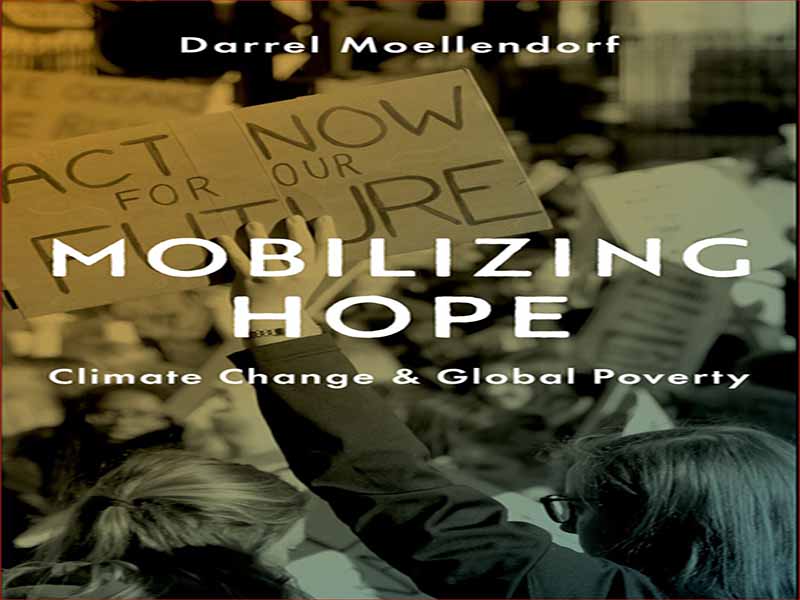- عنوان کتاب: Mobilizing Hope – Climate Change and Global Poverty
- نویسنده/انتشارات: Wendy A. Bach
- حوزه: کاهش فقر
- سال انتشار: 2022
- تعداد صفحه: 257
- زبان اصلی: انگلیسی
- نوع فایل: pdf
- حجم فایل: 10.7 مگابایت
من اولین پیش نویس اولین مقاله خود را در مورد تغییرات آب و هوایی و اولین مقاله ام در مورد امید را پانزده سال پیش نوشتم، زمانی که یک محقق مدعو در دانشگاه رودز در گراهمستون، آفریقای جنوبی بودم. من اولین پیش نویس این نسخه خطی را در آفریقای جنوبی (کشوری که زمانی خانه خود کردم) به پایان رساندم، اما این بار در حین خدمت به عنوان استاد برجسته مدعو در دانشگاه ژوهانسبورگ. بیش از 50 درصد از جمعیت آفریقای جنوبی در فقر زندگی می کنند. رابطه تصادفی بین محیط اطراف فقر و کار روی عدالت، تغییرات آب و هوا و امید برای من برجسته است. با این حال، نوشتههای من همیشه تاکید کردهاند که رابطه بین فقر و تغییرات آب و هوایی بیش از تصادفی است. در این کتاب نیز این موضوع اصلی است. این کتاب حاوی شباهت هایی از مضمون، استدلال و موضع با بسیاری از نوشته های قبلی من در مورد تغییرات آب و هوایی است. با این حال، تفاوت ها و تحولاتی وجود دارد که امیدوارم این نشریه را توجیه کند. استدلالها به گونهای متفاوت بستهبندی و مرتب شدهاند، و با اقبال، این نمایشگاه در دسترستر است. بحث من در مورد انطباق و آنتروپوسن در مسیرهای کاملاً جدیدی است. امید همچنین در بحث محوری است، به گونه ای که قبلاً در نوشته های من در مورد تغییرات آب و هوا وجود نداشته است. علاوه بر این، من این فرصت را داشتم که در ترم زمستانی 2020-21، یک دوره در مورد فلسفه سیاسی مارتین لوتر کینگ جونیور تدریس کنم. اگرچه قبلاً بارها کتاب King را خوانده بودم، اما هرگز به طور سیستماتیک. انتظار داشتم که او در مورد امید حرف های جالبی بزند و ناامید نشدم. اما از اینکه فهمیدم او چه نظریه پرداز پیچیده بسیج توده ای است شگفت زده شدم. من از آموزش به او چیزهای زیادی یاد گرفتم و در بحثهای سیاسی این کتاب، بهویژه بحثهای فصل 6 مربوط به گرین نیو دیل گنجانده شده است. بین زمانی که ایده این کتاب به ذهنم خطور کرد و زمانی که کامل شد، چیزی واقعاً قابل توجه رخ داد. مجموعهای از اعتصابها و تظاهراتهای تودهای که تا حدی از تلاشهای یک دختر دانشآموز شجاع سوئدی، گرتا تونبرگ الهام گرفته شده بود، به صحنه آمد. اگرچه این اعتراضات به دلیل همه گیری COVID-19 متوقف شده است، من اعتماد دارم و امیدوارم که به زودی شاهد تعداد بیشتری از آنها باشیم. این مهمترین و مطمئناً امیدوارکنندهترین تحول در سیاستهای تغییرات آب و هوایی تا به امروز است. من دوست دارم این کتاب به مخاطبانی فراتر از فلسفه دانشگاهی و تئوری سیاسی دست یابد، مخاطبانی که این اعتراضات را نیز تشویق کرده و شاید حتی در آن شرکت کرده باشند. اعتقاد اصلی این کتاب فراتر از آکادمیک مرتبط است – یعنی اینکه یک سیاست امیدوارکننده، که مبتنی بر چشم اندازی از رفاه عمومی و پایداری جهانی است، به بهترین وجه به مشکلات تغییرات آب و هوایی می پردازد. امید، مقوی در برابر استعفا و اضطراب ناتوان کننده است. یک گذار سریع و کامل در اقتصاد جهانی مورد نیاز است. یک چشم انداز امیدوارکننده می تواند به عنوان پایه ای برای بسیج حمایت گسترده مردمی برای انتقال مورد نیاز عمل کند، و چنین حمایت گسترده ای قادر است منافع اقتصادی و اینرسی سیاسی را که در برابر تغییر مقاومت می کنند، شکست دهد.
I wrote first drafts of both my first article on climate change and my first article on hope fifteen years ago when I was a visiting scholar at Rhodes University in Grahamstown, South Africa. I finished the first draft of this manuscript back in South Africa (a country I once made my home), but this time while serving as a Distinguished Visiting Professor at the University of Johannesburg. Over 50 percent of the population of South Africa lives in poverty. The coincidental relationship between the surroundings of poverty and working on justice, climate change, and hope stands out to me. However, my writings have always stressed that the relationship between poverty and climate change is more than coincidental. In this book as well, that is the central theme. This book contains similarities of theme, argument, and positions with many of my previous writings on climate change. There are, however, differences and developments, enough, I hope, to justify this publication. The arguments are packaged and arranged differently, and the exposition is, with luck, more accessible. My discussions of adaptation and the Anthropocene go in entirely new directions. Hope is also central to the discussion in a way that it never has been before in my writing about climate change. Additionally, I had the opportunity to teach a course on the political philosophy of Martin Luther King Jr. in the winter semester of 2020– 21. Although I had read King many times before, never systematically. I expected him to have much interesting to say about hope, and I was not disappointed. But I was surprised to learn what a sophisticated theorist of mass mobilization he is. I learned much from teaching him, and it has been incorporated in the political discussions in this book, especially those in Chapter 6 related to the Green New Deal. Something truly remarkable occurred between the time the idea for this book came to me and when it was completed. A series of school strikes and mass demonstrations, inspired in part by the lone efforts of a brave Swedish schoolgirl, Greta Thunberg, burst onto the scene. Although those protests have been interrupted by the COVID- 19 pandemic, I trust and hope that we will soon see more of them. This is the most important, and certainly the most hope- inspiring, development in climate change politics to date. I’d like this book to reach an audience beyond academic philosophy and political theory, an audience that has also cheered these protests and perhaps even participated in them. The central conviction of this book is relevant beyond academia— namely, that a hopeful politics, one based upon a vision of generalized global prosperity and sustainability, best addresses the problems of climate change. Hope is a tonic against resignation and debilitating anxiety. A rapid and thorough transition in the global economy is needed. A hopeful vision can serve as the basis for mobilizing broad popular support for the needed transition, and such broad support is capable of defeating the economic interests and political inertia that resist change.
این کتاب را میتوانید از لینک زیر بصورت رایگان دانلود کنید:
Download: Mobilizing Hope – Climate Change and Global Poverty




































نظرات کاربران